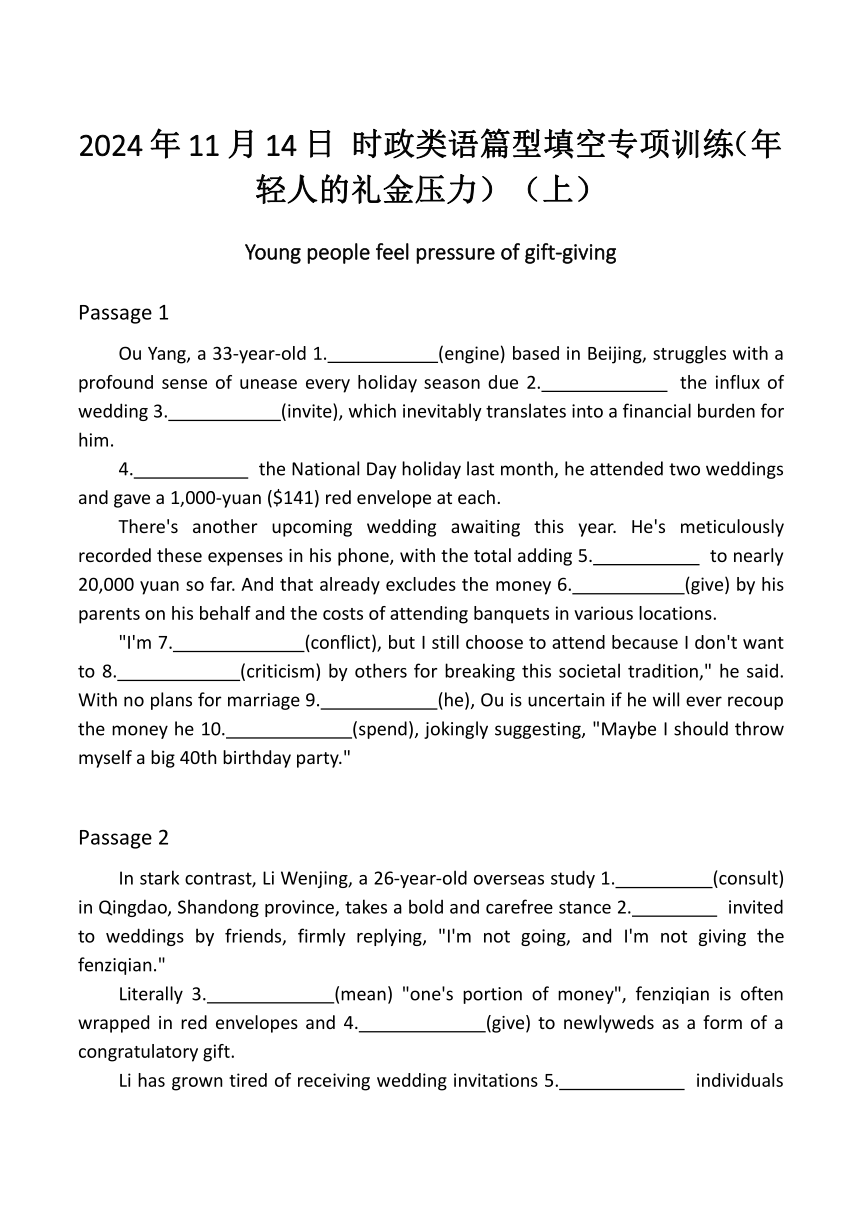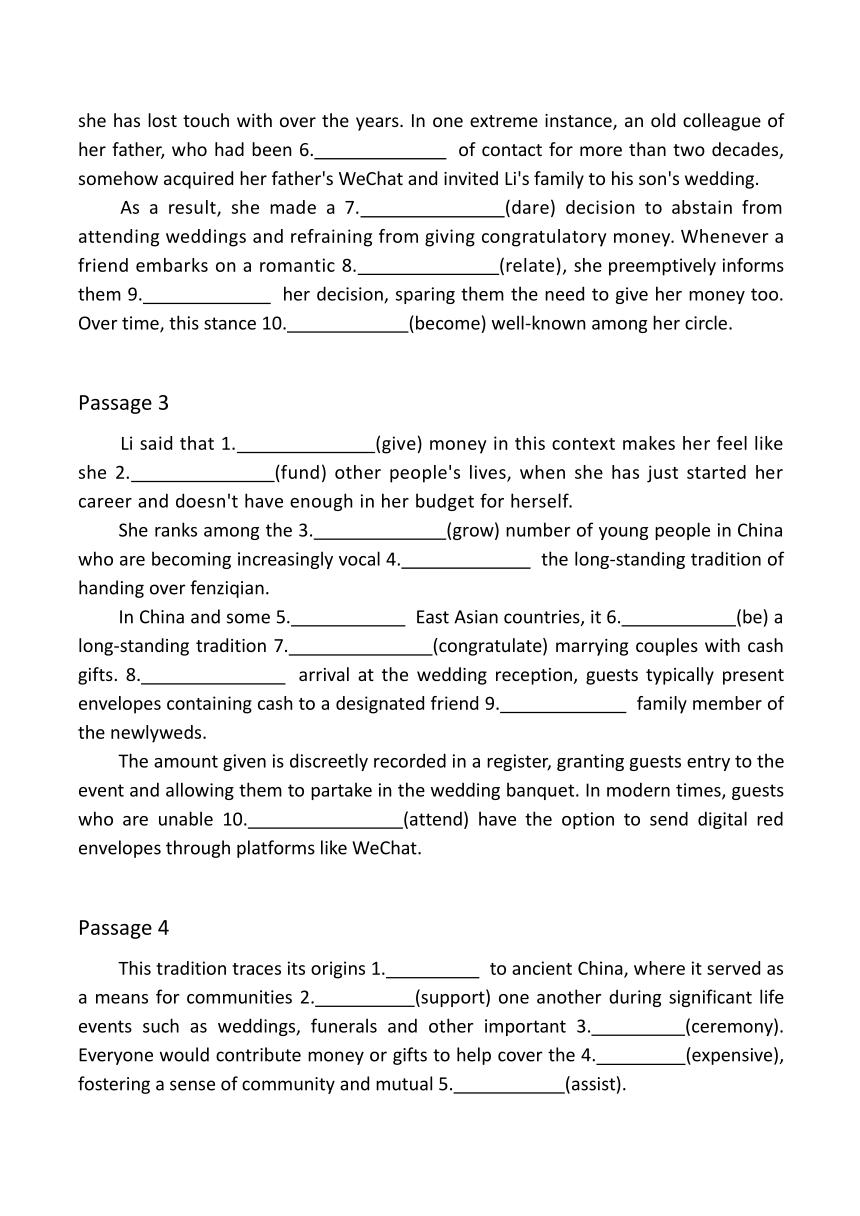2024年11月14日 时政类语篇型填空专项训练(年轻人的礼金压力)(上)(4篇,含答案与译文)-2025届高三英语复习
文档属性
| 名称 | 2024年11月14日 时政类语篇型填空专项训练(年轻人的礼金压力)(上)(4篇,含答案与译文)-2025届高三英语复习 |  | |
| 格式 | docx | ||
| 文件大小 | 28.3KB | ||
| 资源类型 | 教案 | ||
| 版本资源 | 人教版(2019) | ||
| 科目 | 英语 | ||
| 更新时间 | 2025-01-24 16:56:38 | ||
图片预览


文档简介
2024年11月14日 时政类语篇型填空专项训练(年轻人的礼金压力)(上)
Young people feel pressure of gift-giving
Passage 1
Ou Yang, a 33-year-old 1. (engine) based in Beijing, struggles with a profound sense of unease every holiday season due 2. the influx of wedding 3. (invite), which inevitably translates into a financial burden for him.
4. the National Day holiday last month, he attended two weddings and gave a 1,000-yuan ($141) red envelope at each.
There's another upcoming wedding awaiting this year. He's meticulously recorded these expenses in his phone, with the total adding 5. to nearly 20,000 yuan so far. And that already excludes the money 6. (give) by his parents on his behalf and the costs of attending banquets in various locations.
"I'm 7. (conflict), but I still choose to attend because I don't want to 8. (criticism) by others for breaking this societal tradition," he said. With no plans for marriage 9. (he), Ou is uncertain if he will ever recoup the money he 10. (spend), jokingly suggesting, "Maybe I should throw myself a big 40th birthday party."
Passage 2
In stark contrast, Li Wenjing, a 26-year-old overseas study 1. (consult) in Qingdao, Shandong province, takes a bold and carefree stance 2. invited to weddings by friends, firmly replying, "I'm not going, and I'm not giving the fenziqian."
Literally 3. (mean) "one's portion of money", fenziqian is often wrapped in red envelopes and 4. (give) to newlyweds as a form of a congratulatory gift.
Li has grown tired of receiving wedding invitations 5. individuals she has lost touch with over the years. In one extreme instance, an old colleague of her father, who had been 6. of contact for more than two decades, somehow acquired her father's WeChat and invited Li's family to his son's wedding.
As a result, she made a 7. (dare) decision to abstain from attending weddings and refraining from giving congratulatory money. Whenever a friend embarks on a romantic 8. (relate), she preemptively informs them 9. her decision, sparing them the need to give her money too. Over time, this stance 10. (become) well-known among her circle.
Passage 3
Li said that 1. (give) money in this context makes her feel like she 2. (fund) other people's lives, when she has just started her career and doesn't have enough in her budget for herself.
She ranks among the 3. (grow) number of young people in China who are becoming increasingly vocal 4. the long-standing tradition of handing over fenziqian.
In China and some 5. East Asian countries, it 6. (be) a long-standing tradition 7. (congratulate) marrying couples with cash gifts. 8. arrival at the wedding reception, guests typically present envelopes containing cash to a designated friend 9. family member of the newlyweds.
The amount given is discreetly recorded in a register, granting guests entry to the event and allowing them to partake in the wedding banquet. In modern times, guests who are unable 10. (attend) have the option to send digital red envelopes through platforms like WeChat.
Passage 4
This tradition traces its origins 1. to ancient China, where it served as a means for communities 2. (support) one another during significant life events such as weddings, funerals and other important 3. (ceremony). Everyone would contribute money or gifts to help cover the 4. (expensive), fostering a sense of community and mutual 5. (assist).
However, in contemporary society, while the practice of giving cash gifts continues to symbolize support, its role 6. (expand). It has become a way to reciprocate past generosity, with individuals often 7. (keep) track of the amounts they receive to ensure they give a comparable sum when attending future events hosted by the same individuals.
Moreover, the amount given 8. (frequent) corresponds with the closeness of the relationship and societal expectations, sometimes placing pressure 9. individuals to give more than they can 10. (comfort) afford.
参考答案
参考答案1
1.engineer 2.to 3.invitations 4.During 5.up
6.given 7.conflicted 8.be criticized 9.himself 10.has spent
参考译文1
33岁的欧阳(音译)是北京的一名工程师,每逢节假日,他都会因大量涌入的婚礼请柬而深感不安,这不可避免地给他带来了经济负担。
上个月国庆期间,他参加了两场婚礼,每场都给了1000元(141美元)的红包。
今年还会有另一场婚礼。他在手机上仔细记录了这些费用,到目前为止,总计已接近2万元。这还不包括他父母以他的名义给他的钱,以及在各地参加宴会的费用。
他说:“我很矛盾,但我还是选择参加,因为我不想因为打破这种社会传统而被别人批评。”由于自己没有结婚的计划,欧不确定他是否能收回他花的钱,他开玩笑地说,“也许我应该给自己举办一个盛大的40岁生日派对。”
参考答案2
1.consultant 2.when 3.meaning 4.is given 5.from
6.out 7.daring 8.relationship 9.of 10.has become
参考译文2
与之形成鲜明对比的是,26岁的李文静(音译)是山东青岛的一名留学顾问,当朋友邀请她参加婚礼时,她表现得大胆而无忧无虑,坚定地回答说:“我不去,我也不给钱。”
“份子钱”的字面意思是“某人应得的那份钱”,通常用红包包装,作为祝贺礼物送给新婚夫妇。
李已经厌倦了收到多年来失去联系的人发来的婚礼请柬。在一个极端的例子中,她父亲的一个老同事,已经20多年没有联系,不知怎么得到了她父亲的微信,并邀请她的家人参加他儿子的婚礼。
结果,她做了一个大胆的决定:不参加婚礼,不给礼金。每当一个朋友开始一段浪漫的关系时,她都会先发制人地告诉他们她的决定,这样他们以后也不用给她钱。随着时间的推移,这一立场在她的交友圈子里广为人知。
参考答案3
1.giving 2.is funding 3.growing 4.against 5.other
6.has been 7.to congratulate 8.Upon 9.or 10.to attend
参考译文3
李说,在这种情况下给钱让她觉得自己是在资助别人的生活,而她刚刚开始自己的事业,没有足够的预算给自己。
她是中国越来越多的年轻人中的一员,他们越来越强烈地反对把钱交出来的长期传统。
在中国和其他一些东亚国家,用现金礼物祝贺新婚是一个由来已久的传统。到达婚宴现场后,客人通常会将装有现金的信封交给新婚夫妇指定的一位朋友或家人。
支付的金额被谨慎地记录在登记簿上,允许客人进入活动并允许他们参加婚宴。在现代,不能出席的客人可以选择通过微信等平台发送数字红包。
参考答案4
1.back 2.to support 3.ceremonies 4.expenses 5.assistance
6.has expanded 7.keeping 8.frequently 9.on fortably
参考译文4
这一传统的起源可以追溯到古代中国,当时它是社区在重大生活事件(如婚礼、葬礼和其他重要仪式)中相互支持的一种方式。每个人都会捐献金钱或礼物来帮助支付费用,培养社区意识和互助意识。
然而,在当代社会,虽然现金礼物仍然象征着支持,但它的作用已经扩大了。这已经成为一种回报过去慷慨的方式,人们通常会记录他们收到的金额,以确保在未来参加同一个人主办的活动时,他们会给出相当的金额。
此外,给予的数额往往与关系的亲密程度和社会期望相一致,有时给个人施加压力,使其付出超出他们的承受能力。
Young people feel pressure of gift-giving
Passage 1
Ou Yang, a 33-year-old 1. (engine) based in Beijing, struggles with a profound sense of unease every holiday season due 2. the influx of wedding 3. (invite), which inevitably translates into a financial burden for him.
4. the National Day holiday last month, he attended two weddings and gave a 1,000-yuan ($141) red envelope at each.
There's another upcoming wedding awaiting this year. He's meticulously recorded these expenses in his phone, with the total adding 5. to nearly 20,000 yuan so far. And that already excludes the money 6. (give) by his parents on his behalf and the costs of attending banquets in various locations.
"I'm 7. (conflict), but I still choose to attend because I don't want to 8. (criticism) by others for breaking this societal tradition," he said. With no plans for marriage 9. (he), Ou is uncertain if he will ever recoup the money he 10. (spend), jokingly suggesting, "Maybe I should throw myself a big 40th birthday party."
Passage 2
In stark contrast, Li Wenjing, a 26-year-old overseas study 1. (consult) in Qingdao, Shandong province, takes a bold and carefree stance 2. invited to weddings by friends, firmly replying, "I'm not going, and I'm not giving the fenziqian."
Literally 3. (mean) "one's portion of money", fenziqian is often wrapped in red envelopes and 4. (give) to newlyweds as a form of a congratulatory gift.
Li has grown tired of receiving wedding invitations 5. individuals she has lost touch with over the years. In one extreme instance, an old colleague of her father, who had been 6. of contact for more than two decades, somehow acquired her father's WeChat and invited Li's family to his son's wedding.
As a result, she made a 7. (dare) decision to abstain from attending weddings and refraining from giving congratulatory money. Whenever a friend embarks on a romantic 8. (relate), she preemptively informs them 9. her decision, sparing them the need to give her money too. Over time, this stance 10. (become) well-known among her circle.
Passage 3
Li said that 1. (give) money in this context makes her feel like she 2. (fund) other people's lives, when she has just started her career and doesn't have enough in her budget for herself.
She ranks among the 3. (grow) number of young people in China who are becoming increasingly vocal 4. the long-standing tradition of handing over fenziqian.
In China and some 5. East Asian countries, it 6. (be) a long-standing tradition 7. (congratulate) marrying couples with cash gifts. 8. arrival at the wedding reception, guests typically present envelopes containing cash to a designated friend 9. family member of the newlyweds.
The amount given is discreetly recorded in a register, granting guests entry to the event and allowing them to partake in the wedding banquet. In modern times, guests who are unable 10. (attend) have the option to send digital red envelopes through platforms like WeChat.
Passage 4
This tradition traces its origins 1. to ancient China, where it served as a means for communities 2. (support) one another during significant life events such as weddings, funerals and other important 3. (ceremony). Everyone would contribute money or gifts to help cover the 4. (expensive), fostering a sense of community and mutual 5. (assist).
However, in contemporary society, while the practice of giving cash gifts continues to symbolize support, its role 6. (expand). It has become a way to reciprocate past generosity, with individuals often 7. (keep) track of the amounts they receive to ensure they give a comparable sum when attending future events hosted by the same individuals.
Moreover, the amount given 8. (frequent) corresponds with the closeness of the relationship and societal expectations, sometimes placing pressure 9. individuals to give more than they can 10. (comfort) afford.
参考答案
参考答案1
1.engineer 2.to 3.invitations 4.During 5.up
6.given 7.conflicted 8.be criticized 9.himself 10.has spent
参考译文1
33岁的欧阳(音译)是北京的一名工程师,每逢节假日,他都会因大量涌入的婚礼请柬而深感不安,这不可避免地给他带来了经济负担。
上个月国庆期间,他参加了两场婚礼,每场都给了1000元(141美元)的红包。
今年还会有另一场婚礼。他在手机上仔细记录了这些费用,到目前为止,总计已接近2万元。这还不包括他父母以他的名义给他的钱,以及在各地参加宴会的费用。
他说:“我很矛盾,但我还是选择参加,因为我不想因为打破这种社会传统而被别人批评。”由于自己没有结婚的计划,欧不确定他是否能收回他花的钱,他开玩笑地说,“也许我应该给自己举办一个盛大的40岁生日派对。”
参考答案2
1.consultant 2.when 3.meaning 4.is given 5.from
6.out 7.daring 8.relationship 9.of 10.has become
参考译文2
与之形成鲜明对比的是,26岁的李文静(音译)是山东青岛的一名留学顾问,当朋友邀请她参加婚礼时,她表现得大胆而无忧无虑,坚定地回答说:“我不去,我也不给钱。”
“份子钱”的字面意思是“某人应得的那份钱”,通常用红包包装,作为祝贺礼物送给新婚夫妇。
李已经厌倦了收到多年来失去联系的人发来的婚礼请柬。在一个极端的例子中,她父亲的一个老同事,已经20多年没有联系,不知怎么得到了她父亲的微信,并邀请她的家人参加他儿子的婚礼。
结果,她做了一个大胆的决定:不参加婚礼,不给礼金。每当一个朋友开始一段浪漫的关系时,她都会先发制人地告诉他们她的决定,这样他们以后也不用给她钱。随着时间的推移,这一立场在她的交友圈子里广为人知。
参考答案3
1.giving 2.is funding 3.growing 4.against 5.other
6.has been 7.to congratulate 8.Upon 9.or 10.to attend
参考译文3
李说,在这种情况下给钱让她觉得自己是在资助别人的生活,而她刚刚开始自己的事业,没有足够的预算给自己。
她是中国越来越多的年轻人中的一员,他们越来越强烈地反对把钱交出来的长期传统。
在中国和其他一些东亚国家,用现金礼物祝贺新婚是一个由来已久的传统。到达婚宴现场后,客人通常会将装有现金的信封交给新婚夫妇指定的一位朋友或家人。
支付的金额被谨慎地记录在登记簿上,允许客人进入活动并允许他们参加婚宴。在现代,不能出席的客人可以选择通过微信等平台发送数字红包。
参考答案4
1.back 2.to support 3.ceremonies 4.expenses 5.assistance
6.has expanded 7.keeping 8.frequently 9.on fortably
参考译文4
这一传统的起源可以追溯到古代中国,当时它是社区在重大生活事件(如婚礼、葬礼和其他重要仪式)中相互支持的一种方式。每个人都会捐献金钱或礼物来帮助支付费用,培养社区意识和互助意识。
然而,在当代社会,虽然现金礼物仍然象征着支持,但它的作用已经扩大了。这已经成为一种回报过去慷慨的方式,人们通常会记录他们收到的金额,以确保在未来参加同一个人主办的活动时,他们会给出相当的金额。
此外,给予的数额往往与关系的亲密程度和社会期望相一致,有时给个人施加压力,使其付出超出他们的承受能力。
